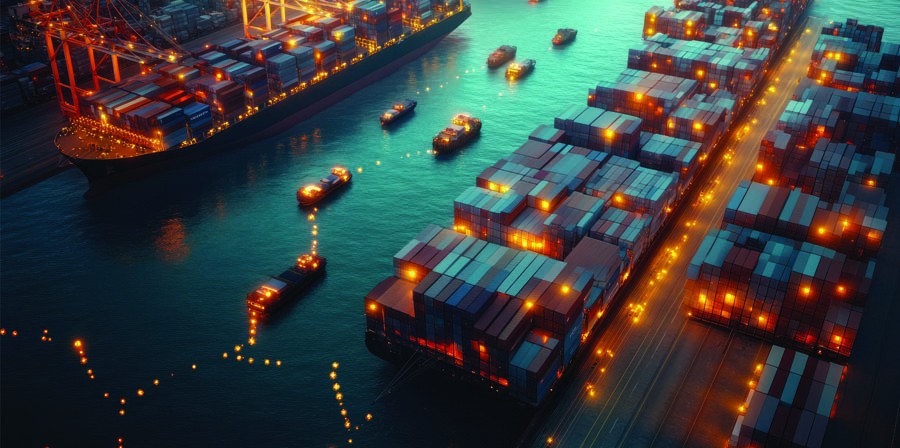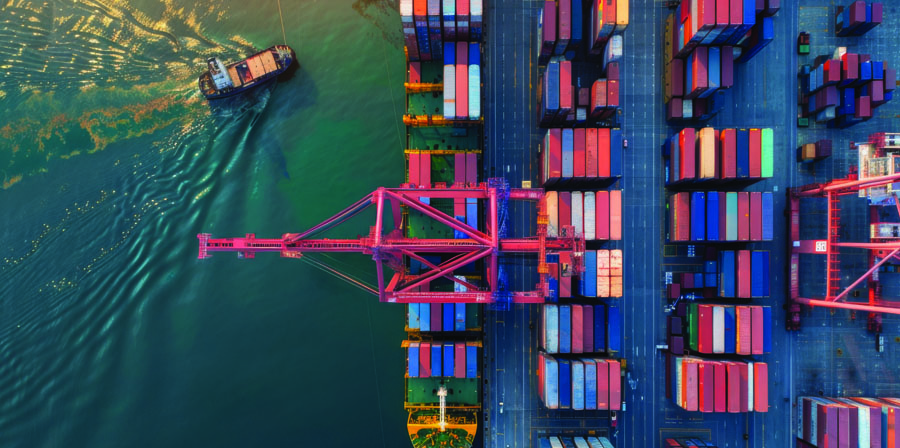Navigating the complexities of ocean freight management is a daunting task. It becomes even more challenging during disruptions like the east coast longshoreman strike.
This strike, a significant event in the logistics industry, has far-reaching implications. It affects not only the operations of ports but also the global supply chain.
In this article, we delve into the intricacies of managing ocean freight amidst such disruptions. We focus on the peak season of 2024, a critical period for freight transportation.
We'll explore what is affected by the strike and how to mitigate its impact. We'll also highlight ports that remain unaffected, such as Gloucester Terminals and PENN Terminals.
Armed with this knowledge, you'll be better equipped to navigate the choppy waters of ocean freight management. Let's set sail on this journey of discovery.
Understanding Ocean Freight Management
Ocean freight management is a critical component of global trade. It involves the coordination of various activities to ensure the efficient movement of goods across the world's oceans.
Key tasks include selecting shipping routes, managing freight rates, and ensuring compliance with international shipping regulations. It also involves coordinating with various stakeholders, such as shipping lines, customs authorities, and freight forwarders.
Effective ocean freight management can provide several benefits:
- Cost savings through optimized shipping routes and freight rates
- Improved reliability and predictability of shipments
- Enhanced visibility and control over the supply chain
- Compliance with international shipping regulations
However, this process can be disrupted by unforeseen events, such as a longshoreman strike.
The Role of the International Longshoremen's Association (ILA)
The International Longshoremen's Association (ILA) plays a pivotal role in the operations of ports. This labor union represents longshoremen, the workers responsible for loading and unloading cargo from ships.
In the event of a dispute over wages, working conditions, or other issues, the ILA can call for a strike. This action can halt operations at ports, leading to significant disruptions in ocean freight management.

Historical Context of Longshoreman Strikes
Longshoreman strikes have a long history of disrupting global supply chains. These labor disputes often result in delayed shipments, increased costs, and strained relationships between shippers and carriers.
For instance, the west coast longshoreman strike of 2002 resulted in an estimated $1 billion loss per day for the U.S. economy. It highlighted the vulnerability of global supply chains to labor disputes at ports.
Understanding this historical context can help businesses better prepare for and manage the impact of such disruptions.
The East Coast Longshoreman Strike: Implications for Ocean Freight
The East Coast longshoreman strike presents a significant challenge for ocean freight management. The strike disrupts the normal flow of goods, leading to delays and increased costs.
Shipping schedules are thrown off balance, with ships unable to load or unload cargo at the affected ports. This disruption can have a ripple effect, causing delays in other parts of the supply chain.
Moreover, the strike can lead to a shortage of containers, further complicating the logistics of ocean freight. Freight rates may also rise due to the increased demand and limited supply of shipping services.
What is Affected by the Strike
The strike affects various aspects of ocean freight management.
These include:
- Shipping schedules: Ships may be delayed or rerouted, leading to disruptions in the supply chain.
- Container availability: The strike can lead to a shortage of containers, making it more difficult to ship goods.
- Freight rates: With the supply of shipping services limited, freight rates may increase.
These disruptions can have a significant impact on businesses, particularly those that rely heavily on ocean freight for their operations.
Unaffected Ports: Strategic Importance of Gloucester Terminals, PENN Terminals, and More
Not all ports are affected by the east coast ILA longshoreman strike. Along with Gloucester Terminals in Gloucester City, NJ, and PENN Terminals in Chester, PA, several other key ports remain operational. These include:
- King Ocean/Crowley – Port Everglades, FL
- Seaboard Miami – Miami, FL
- Jacinto Port – Houston, TX
These ports offer valuable alternatives for businesses looking to mitigate the impact of the strike. By rerouting shipments to these unaffected locations, companies can maintain operations and minimize disruptions to their supply chains during this critical time. Diversifying port options is essential to avoid potential bottlenecks, especially during peak season 2024.
Peak Season 2024: Preparing for the Challenges
The peak season of 2024 presents additional challenges for ocean freight management. This period typically sees a surge in demand for shipping services, putting further strain on an already disrupted supply chain.
The longshoreman strike, coupled with the peak season, can lead to severe bottlenecks at ports. Businesses must therefore plan ahead and develop strategies to navigate these challenges.
Effective ocean freight management during this period requires a combination of contingency planning, diversification of supply chain routes, and the use of technology to enhance visibility and control.

Strategies for Managing Ocean Freight During a Longshoreman Strike
Managing ocean freight during a longshoreman strike requires a proactive and strategic approach. Businesses must anticipate potential disruptions and develop contingency plans to mitigate their impact.
Key strategies include:
- Diversifying supply chain routes: By using multiple ports and shipping routes, businesses can reduce their reliance on any single point of failure.
- Establishing strong relationships with multiple carriers: This can provide businesses with more options and flexibility in their shipping arrangements.
- Proactive communication with stakeholders: Keeping all parties informed of the situation can help manage expectations and facilitate collaborative problem-solving.
These strategies can help businesses maintain their operations and ensure the timely delivery of goods, even in the face of a longshoreman strike.
The Role of Ocean Freight Management Software
Ocean freight management software plays a crucial role in navigating disruptions like a longshoreman strike. Such software provides real-time visibility into shipping operations, enabling businesses to monitor the situation and make informed decisions.
Key features of ocean freight management software include:
- Real-time tracking: This allows businesses to monitor the status of their shipments and adjust their plans as needed.
- Predictive analytics: By analyzing historical and real-time data, the software can forecast potential disruptions and suggest optimal shipping routes.
By leveraging ocean freight management software, businesses can enhance their resilience and maintain control over their supply chain operations, even during a longshoreman strike.
Mitigating the Impact: Contingency Planning and Alternative Routes
In the face of a longshoreman strike, contingency planning becomes crucial. Businesses must anticipate potential disruptions and develop strategies to mitigate their impact. This involves identifying alternative shipping routes and ports, and establishing strong relationships with multiple carriers.
Key elements of a contingency plan include:
- Scenario planning: Businesses should consider various scenarios and develop plans for each.
- Risk assessment: Identify potential risks and develop strategies to mitigate them.
- Communication plan: Establish a clear communication strategy to keep all stakeholders informed.
By having a robust contingency plan in place, businesses can navigate the challenges of a longshoreman strike and ensure the continuity of their operations.
Diversifying Supply Chain Routes and Port Options
Diversifying supply chain routes and port options is a key strategy for managing ocean freight during a longshoreman strike. By using multiple ports and shipping routes, businesses can reduce their reliance on any single point of failure.
This strategy not only mitigates the impact of a strike but also enhances the resilience of the supply chain. It provides businesses with more options and flexibility in their shipping arrangements, enabling them to adapt to changing circumstances and maintain the timely delivery of goods.

Jillamy International: Your Partner for Navigating Ocean Freight Challenges
During the complexities of the ILA strike, businesses need a reliable logistics partner to keep their operations running smoothly. Jillamy International offers comprehensive solutions to help you manage ocean freight and supply chain disruptions with expertise and flexibility.
Container Freight Services
Jillamy’s ocean container services provide end-to-end solutions for managing your ocean freight efficiently. With access to a wide network of carriers, Jillamy offers flexible Full Container Load (FCL) and Less than Container Load (LCL) options to accommodate shipments of all sizes. Even amid the strike, you can rely on Jillamy's ability to secure space on vessels and ensure your shipments are routed through unaffected ports like Gloucester Terminals, PENN Terminals, and others, ensuring timely delivery.
Global Reach with Local Expertise
Leveraging a strong international footprint, Jillamy offers a seamless global shipping experience. Their international logistics solutions include customs brokerage, global trade compliance, and real-time shipment tracking, providing full visibility over your supply chain. Whether it’s alternative routing strategies or navigating customs during port disruptions, Jillamy's expertise helps minimize delays and optimize costs.
Air Freight Alternatives
If ocean freight is heavily impacted by the strike, Jillamy can offer international air freight solutions as a fast and reliable alternative. Their air freight services provide expedited transit times, helping mitigate supply chain disruptions by delivering critical goods quickly and securely. With options for both door-to-door and airport-to-airport services, Jillamy ensures you can maintain supply continuity despite any ocean freight delays.
In uncertain times like the ILA strike, Jillamy International's robust service offerings and strategic partnerships help businesses continue moving their goods across borders without significant delays or cost increases.
Conclusion: Ensuring Resilience in Ocean Freight Management
In conclusion, managing ocean freight during a longshoreman strike requires a strategic approach. Businesses must anticipate potential disruptions, diversify their supply chain routes, and leverage technology to maintain visibility and control over their operations.
While the strike presents significant challenges, it also offers an opportunity for businesses to enhance their resilience and adaptability. By developing robust contingency plans and utilizing ocean freight management software, companies can navigate these disruptions with confidence.
Contact Jillamy Today
Don’t let supply chain disruptions hold you back. Jillamy’s team of logistics experts is ready to assist you with personalized solutions to keep your freight moving. Whether it's rerouting through alternative ports or managing international shipments, Jillamy has the tools and experience to help you navigate these challenging times.
Contact Jillamy today to learn more about how we can support your business during the ILA strike.


